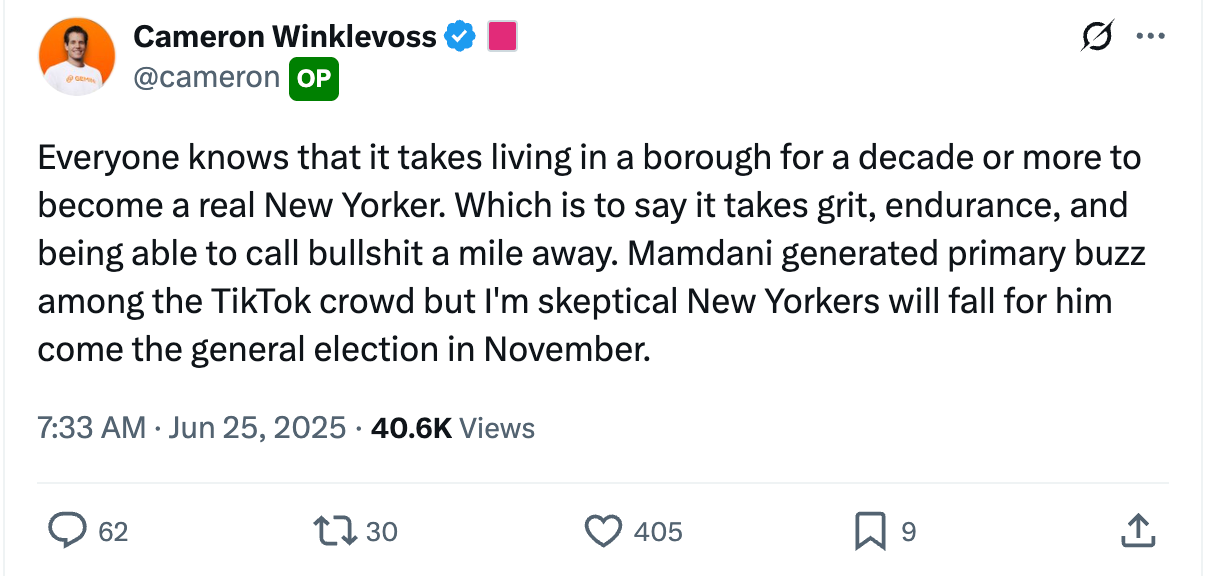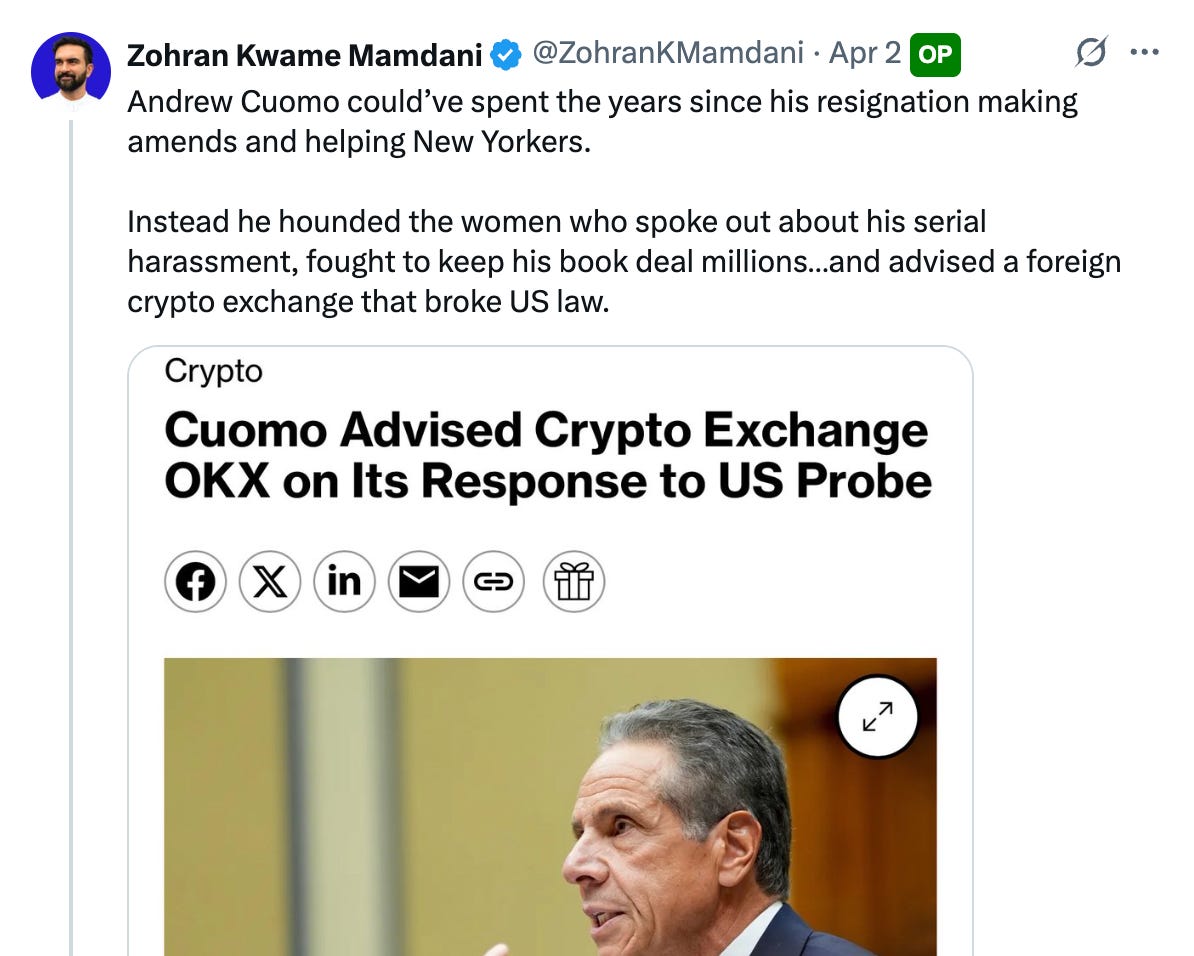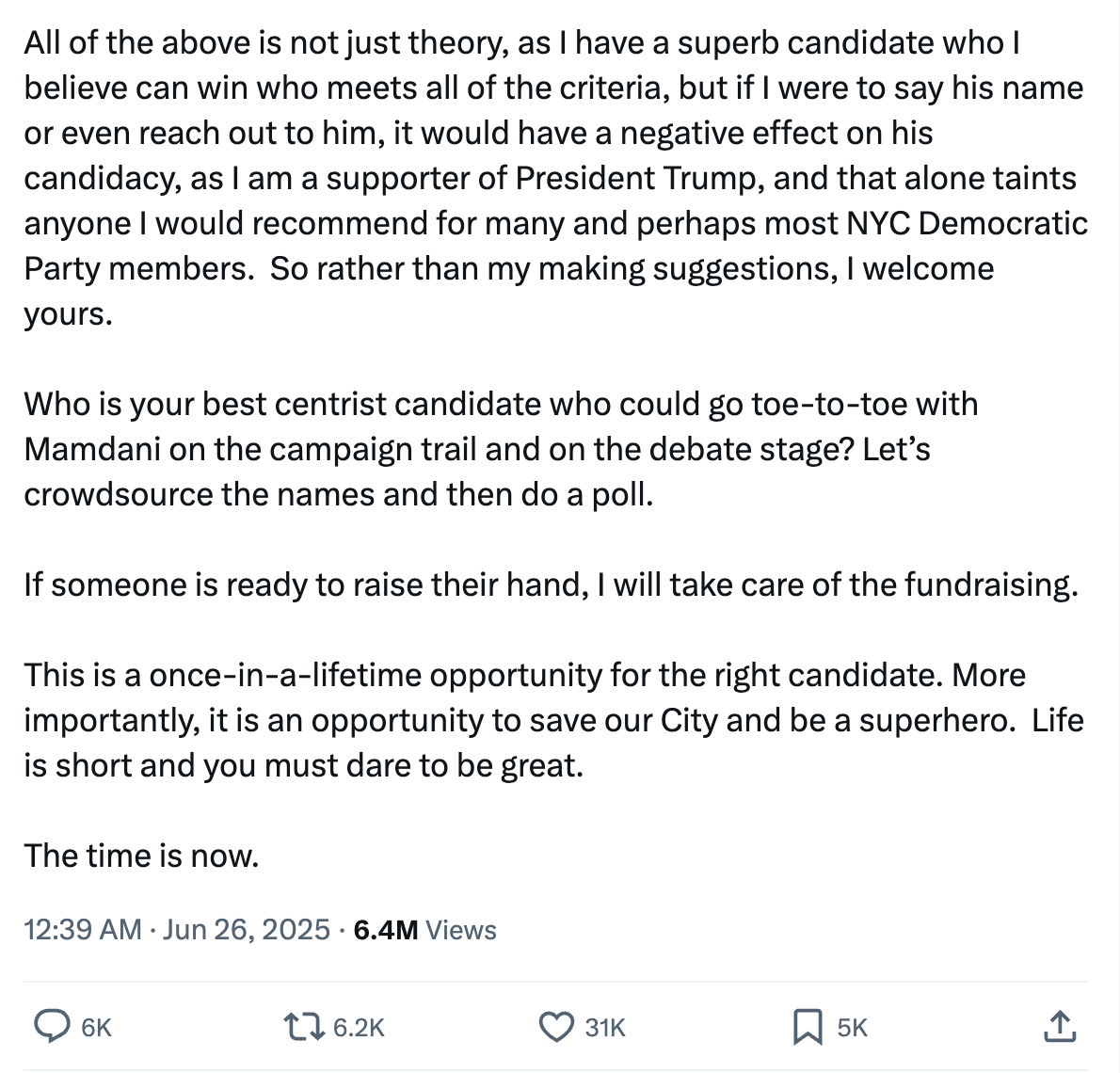Comrade in Gracie Mansion?
After Zohran Mamdani's victory, crypto asks what is next in New York.
Brogan Law provides top-quality legal services to individuals and entities with questions related to cryptocurrency. Cryptocurrency law is still new, and our clients recognize the value of a nimble and energetic law firm that shares their startup mentality. To help our clients maintain a strong strategic posture, this newsletter discusses topics in law that are relevant to the cryptocurrency industry. While this letter touches on legal issues, nothing here is legal advice. For any inquiries email info@broganlaw.xyz
This week, Zohran Mamdani won Democratic primary in the New York City mayoral election.1 His strongest opponent, Andrew Cuomo was hobbled by both (i) a track record of scandal and (ii) an anemic campaign built on endorsements rather than direct outreach to voters. Mr. Mamdani, by contrast, ran a left-populist campaign promising cheap rent and groceries. The son of an Oscar-nominated filmmaker, he developed highly polished social media content that circulated widely.
New York has always been a major hub for cryptocurrency firms. Players like Consensys and Uniswap got their start here, and over the last few years yet more firms, like MoonPay and the SEI Development Foundation, have moved operations here. This has been despite the least favorable state-level regulatory environment in the country, because New York is the natural home of finance. So while the everything bagel blockchain of 2021 moved to Miami, crypto qua financial system is based here.
For this reason, Mr. Mamdani’s rise has made many in the crypto community nervous. We live here, so we are exposed to his policies! And left-populists like Elizabeth Warren have a particularly egregious track record of persecuting the cryptocurrency industry for political gain. Adherents to this movement wound up controlling a large percentage of staff-level roles in the Biden administrations, and their policies made it virtually impossible for the cryptocurrency industry to operate in the United States, while causing many individuals who worked in the industry to lose access to banking services.
Mr. Mamdani occupies an even more extreme faction of left-populism, which is sometimes called “race-communism” by critics, that believes in redistributing wealth and political favor based on the race or intersectional status of the parties involved. This, rightfully, makes some of the targets of the movement very nervous.

It is not a foregone conclusion that Mr. Mamdani will win the general election in November — Polymarket currently gives him a 68% chance — but, compared to one week ago, it is certainly a moment to re-rate our priors and think hard about the risks that a Mamdani mayoralty would pose to the cryptocurrency industry in New York. So this week, I am going to cover the office and think hard about what a left-populist mayor might actually be able to do to New York.
The New York City Mayor
Generally, local governments in the United States follow a Madisonian governance model. This involves one (and often two) legislative bodies balancing a strong executive with the authority to implement these laws. In the federal government, this is the Congress and President, at the state level there are governors and state assemblies of various forms, and in municipalities, generally, a mayor and city council.
By the time you drill down to the level of municipal governance, though, the actual authority any given executives might have varies widely between places. Many readers will be familiar with the supremacy clause of the U.S. Constitution, which says that federal law preempts state law. Local law, in turn, is a creation of state law. While the states are reserved any authority not otherwise delegated to the federal government by the reserve clause of the Constitution, no similar right extends to municipalities. They are granted power by state law and city charters. In this way, the American model of governance is a matryoshka — multiple layers stacked on top of each other with varying authority delegated between them.

In practice, there are two broad categories of local governance in the United States, Home-rule localities can exercise any power not expressly limited by the state constitution or statutes, while Dillon’s-Rule localities may act only when the state has (i) expressly granted a power, (ii) clearly implied it, or (iii) deemed it indispensable to the locality’s declared purposes. And New York, through Article IX of its state constitution, is a Home-rule state. Local governments are entitled to enact their own laws so long as they do not conflict with other law.
The mayor, in turn, is empowered by the New York City charter, adopted by the state in 1898. Generally, the New York City Mayor is considered among the most powerful local executives in the United States, both because of the authorities delegated therein and the massive budget they sit on top of.
But they’re still a mayor.
Unlike the city government as a whole, the powers of the mayor specifically do not extend to any act not-otherwise-prohibited. New York state courts have specifically circumscribed the executive's authority. In Subcontractors Trade Ass’n v. Koch, 62 N.Y.2d 422, 427–29 (1984), then-Mayor Ed Koch attempted to use the office’s general contracting power to mandate by executive order that 10% of contracting should be given to “local enterprise,” and was overruled because such action “beyond his function of implementing general Charter-conferred powers. Such action constitutes an exercise of legislative power.”
By the same virtue, however, the New York City Council does not have the authority to intervene in areas where the mayor has directly delegated authority, such as the appointment of officers in executive departments.2
This, in effect, leaves the mayor as a strong executive within the office’s prescriptively narrow fiefdoms, but without much other direct authority.
The office’s power is mostly manifested through the numerous city agencies over which the mayor has direct control. The largest of these are the Department of Education (Mr. Mamdani has proposed ending test-in schools like Bronx Science and Stuyvesant), the Department of Social Services (Mr. Mamdani has proposed offering universal free child care), and the Police Department (Mr. Mamdani has been a longtime proponent of defunding the police).
The mayor also has significant control over the city budget, which the office is tasked with preparing, and wields effective control over discretionary spending across agencies. The office is influential in zoning too, having a definitive veto over the city council’s land use decisions.
The perceptive reader, however, might have noticed that most of these powers don’t directly affect the crypto industry. Obviously good schools and safe streets matter to those who work in the crypto industry as much as anyone else, but failures in these areas alone hardly presage the apocalypse for the city that some have predicted.

What a Mamdani Administration Could Do
Still, there is much a Mamdani administration could do to squeeze the city's crypto industry if he wanted to. The most obvious use of power is in its raw form, using the Gracie Mansion bully pulpit to condemn the industry. To this end a devoted foe could organize allies to act against the industry, speak out against it, and cut backroom deals with third parties.
A more concerning risk is Mr. Mamdani’s potential to pressure Albany. Though the BitLicense regime is state-administered, mayoral influence can sway legislative priorities, especially with aligned majorities in the Assembly and Senate.
Beyond this informal authority, the mayor could also use the office’s authority to work against the industry directly by stalling crypto projects office space developments, harassing businesses over permits, and forbidding city agencies from engaging with crypto firms as counterparties. All of that could be problematic, but only to a point.
The truth is that cryptocurrency firms generally operate light. They don’t need massive real estate or specialized equipment, just a room full of human capital and an idea. This makes them relatively less sensitive on the development side from local pressures. Obviously, energy intensive applications like Bitcoin mining are a different story, but nobody is doing that in New York anyway.
One could imagine problems at the retail level, but precisely because NYDFS has been so aggressive toward the cryptocurrency industry, many firms either avoid the state entirely or else exist within the state BitLicense regime, which would likely insulate them from direct city pressure.
But that doesn’t mean that there wouldn’t be any attack vectors for an aggressive mayor to harm the cryptocurrency industry in New York. The NYC Banking Commission is controlled by a three-person board composed of the mayor themself, the separately elected comptroller, and the Finance Commissioner, a mayoral appointee. This means that in effect, the mayor is able to exercise control over the Commission.
While the Banking Commission doesn’t have direct authority over banks, the mayor has historically used it to implement policy priorities. The city has significant capital deposits at various banks, and so it can threaten to move these deposits to attempt to force those banks to do its will. For instance, in 2023 it demanded that Capital One and Keybank submit anti-discrimination plans, and when they didn’t, voted to pull deposits. The office could run the same playbook against crypto.
So there are levers that a hostile mayor could pull to hurt crypto, and they could probably set the industry back to a point. Still, you have to ask, would it want to?
The Ideologue or the Opportunist?
Capital is the natural adversary of the socialist, so it is reasonable to anticipate that a Mamdani administration would be hostile to the cryptocurrency industry. This view is not unsupported. During the primary campaign, Mr. Mamdani was critical of his opponent Andrew Cuomo for working with the exchange OKX.

But on the other hand, this is basically all he has said about cryptocurrency during his short time in public life. While one might expect that he will choose to align with other left-populists like Elizabeth Warren, it is possible that his views are as yet unformed. Other members of the Democratic party, including New York congressional delegates Kirsten Gillibrand and Richie Torres, have been vocal proponents for the cryptocurrency industry. It is the industry’s bipartisan support that has given it a reasonable chance of achieving legislation this year.
We are accustomed to national politicians taking hardline stances in public, leading to intense polarization in federal party politics. But this tendency is an artifact of the limited remit that congressional members have. Their job is to raise money, vote yes when the whip tells them, and win primaries.
For a mayor, the stakes are different. They will ultimately be accountable for the city, and this makes it very difficult to vocally oppose major industry within those boundaries. New York is spoiled with a surfeit of business, but it was not so long ago that commercial real estate interests were hurting, with the growing crypto industry looking like an appealing opportunity to fill empty offices.
Mr. Mamdani has built a political career on sharply divisive political posturing, and while his left-populist predecessors, London Breed in San Francisco and Brandon Johnson in Chicago, were ultimately unable to overcome the baser instincts of their movement, there is no guarantee Mr. Mamdani will not moderate now that he is in the spotlight. For someone who has never had name recognition before, this is a star turn, and there is no telling how it will change him. If he is more opportunist than true believer at heart, his potential malleability could be an opportunity for the crypto industry to gain a greater foothold in New York.
Strategy or Self-Immolation?
After Mr. Mamdani won Tuesday, some prominent voices like Bill Ackman floated the idea of funding third party candidates to enter the race.

To those who are offended by Mr. Mamdani’s support for the phrase “globalize the intifada” and promise to arrest Bibi Netanyahu, there is a certain moral purity to funding his opposition. But realpolitik suggests the opposite.
To parrot famed political strategist Bradley Tusk’s take this week, the Democratic primary is generally the big game in this city, and this general election will probably not be competitive:
(2). The general election is not going to be competitive. Even if Cuomo runs as an independent, he was heavily rejected last night. The voters don’t want him back — and he didn’t seem to want the job either. Adams polls at around 10% in terms of favorability and re-elect. He is not winning. Sliwa might do better than he did in 2021 but to be the GOP candidate without the support of Trump means he might not even hold onto the regular base (Adams could get some of those votes), so him coming out on top is very unlikely. And there’s a ton of energy on the left because of Trump and that isn’t going away anytime soon (if anything, Trump is Mamdani’s perfect foil and visa-versa, so they will both knowingly engage in a constant war that delights both of their bases).
While it is not certain, Mamdani is still the odds on favorite to win in November. It can’t be value maximizing to throw good money after bad. Instead, the industry should bet that this politician is as subject to venality and hypocrisy as the next. Give money to his campaign. Talk to him. Win his favor. This is perhaps the best opportunity the cryptocurrency industry will ever have to shape the young politician’s views. Democratic socialist or not, a dollar sign smile is rarely turned away.
This strategy is hardly new. Bribes built businesses behind the iron curtain, so maybe campaign checks will win over communists here as well.
Until next week.
Brogan Law is a registered law firm in New York. Its address and contact information can be found at https://broganlaw.xyz/
Brogan Law provides this information as a service to clients and other friends for educational purposes only. It should not be construed or relied on as legal advice or to create a lawyer-client relationship. Readers should not act upon this information without seeking advice from professional advisors.
Technically, because New York uses ranked choice voting and Mr. Mamdani has only accrued 43% of the vote, he will not have won until subsequent choice ballots are counted, but most outlets treat this as a fait accompli, and Mr. Cuomo has already conceded.
Credit to Twenty-Five Years of the Council-Mayor Governance of New York City: A History of the Council’s Powers, the Separation of Powers, and Issues for Future Resolution by Elizabeth Fine and James Caras for the insights of the previous two paragraphs.






